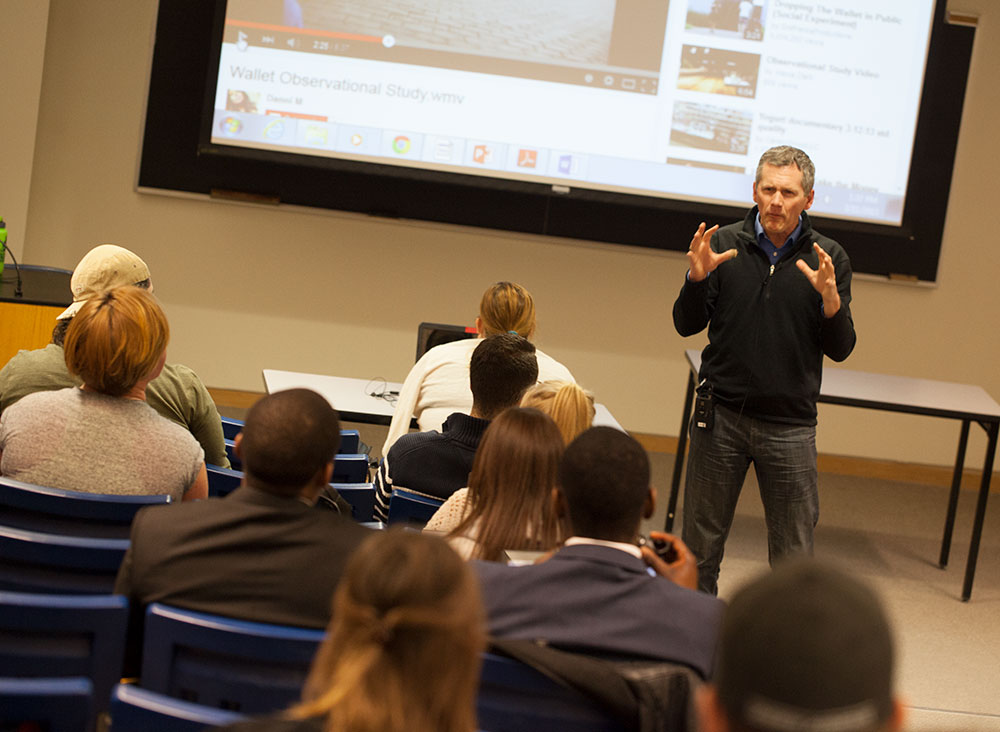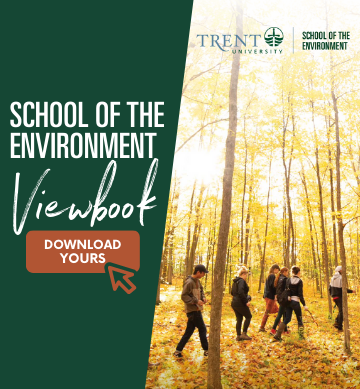Geography
Explore the interactions between people and the physical environment through either the B.A. or B.Sc. pathways of this popular degree program. B.A. students focus their studies on how people encounter and shape their environments, while B.Sc. students examine the human and natural forces that shape the physical world, investigating topics in climate, hydrology, natural hazards, soils, and earth materials. With numerous options for joint majors and an emphasis on field-based learning, Geography at Trent offers you a wide variety of ways to deepen your learning in the classroom and beyond to dive into the study of human and natural spatial formations and patterns.
Accelerated Masters
Earn your M.Sc. in Environmental & Life Sciences in only 12-16 months after graduating from your honours B.Sc.
Degrees Offered:
- B.A.
- B.A. (Honours)
- B.Sc.
- B.Sc. (Honours)
Locations:
- Peterborough
Specializations:
Resume Boosters:
- Conduct research in leading research facilities, such as Trent’s on-campus wind tunnel lab, remote sensing and GIS computer labs, and the Trent Climate Station
- Participate in a capstone project or community-based research, helping to solve geographic challenges for community groups, government agencies, or local businesses
- Complete an undergraduate honours thesis, an independent research project that will see you delving deeper into a specific topic, such as sustainable forestry practices, erosion control in mining, or urban planning

“The best part of my program was that I got to complete an honours thesis and I got a lot of hands-on experience; almost all of the courses I've taken have a field component.”
Career Paths:
Featured
Geomatics Technician - Geographical Information Systems (GIS)
Technical occupations in geomatics include aerial survey, remote sensing, geographic information systems, cartographic and photogrammetric technologists and technicians, who gather, analyze, interpret and use geospatial information for applications in natural resources, geology, environmental research and land use planning. Meteorological technologists and technicians observe weather and atmospheric conditions, record, interpret, transmit and report on meteorological data, and provide weather information to the agricultural, natural resources and transportation industries and the public. Geomatics technologists and technicians are employed by all levels of government, utilities, mapping, computer software, forestry, architectural, engineering and consulting firms and other related establishments. Meteorological technologists and technicians are employed by all levels of government, the media, natural resources, utilities and transportation companies and consulting firms.
Career Opportunities
- Urban Planner
- Engineer
- Environmental Health Specialist
- Geologist
- Policy Analyst
- GIS Applications
- Population Growth and Migration Specialist
- Land Surveyor
- Water Resources Manager
- Geoscience Consultant
- Ecologist
- Park Ranger
- Meteorologist
- Geomatics Specialist
- Demographer
Popular Courses:
- The Global Climate System
- Geography of the Polar Regions
- Soil Science
- Circumpolar Studies
- Geography of Tourism
- Parks and Protected Areas Management
- Geographic Information Systems
- Environmental Geology

Admission Requirements
More Requirements
Discover Ontario's
#1 Undergrad University
Where award-winning architecture meets state-of-the-art research facilities and dynamic student spaces.
Visit TrentReady to Take the Next Step?
Tell us more about yourself and we’ll tell you all the reasons you belong at Trent.
Stay in Touch

